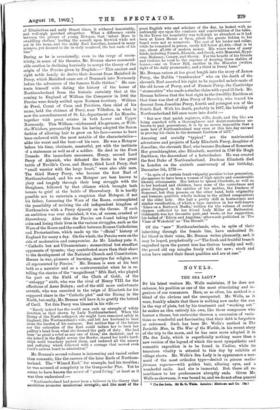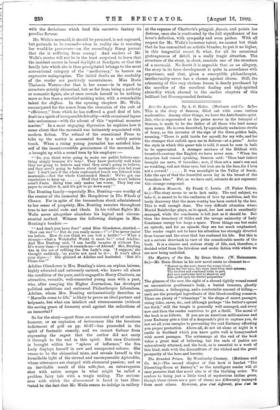BY his latest venture Mr. Wells maintains, if he does
not enhance, his position as one of the most stimulating and in- genious of our romancers. Here, as so often, his method is a blend of the obvious and the unexpected. Mr. Wells, as it were, frankly admits that there is nothing new under the sun in the way of plots, but by his treatment and "working out" he makes an idea entirely his own, like those composers who borrow a theme, but embroider thereon a succession of varia- tions so wonderful and fascinating that their debt is forgotten or redeemed. Such has been Mr. Wells's method in The Invisible Man, in The War of the Worlds, in his recent story of the trip to the moon, and he has once more adopted it in The Sea Lady, which is superficially nothing more than a new version of the legend of which the most sympathetic and romantic exposition is to be found in Undine, while its tenacious vitality is attested to this day by exhibits at village shows. Mr. Wells's Sea Lady is in appearance a, mer- maid of the most orthodox type—desinit in piscem, mulier formosa superne—with golden hair, alluring eyes, and a wonderful smile. And she is immortaL But there all re- semblance to her predecessors abruptly ends. Given Mr. Wells as showman, it was bound to, and we do not often quarrel • 11. ga Lis. 31 1 G•Ws/la. London Methuen sod Co. feal
with the deviations which lend this eccentric fantasy its peculiar flavour.
Mr. Wells's mermaid, it should be premised, is not captured, but pretends to be rescued—when in reality she is rescuing her would-be preservers—on the exceedingly flimsy pretext that she is suffering from cramp ! And readers of Mr. Wells's stories will not be in the least surprised to learn that the incident occurs in broad daylight at Sandgate, or that the family into which she is thus precipitated belongs to the most conventional category of the " mediocracy," to borrow an expressive malapropism. The initial drafts on the credulity of the reader are positively mountainous. Miss Doris Thalassia Waters—for that is her name—is in regard to structure strictly chimerical, but • so far from being a pathetic or romantic figure, she at once reveals herself to be nothing more or less than a mischief-making minx, with a remarkable
talent for chiffons. In the opening chapters Mr. Wells, emancipated for the nonce from the obsession of the cult of
"efficiency," from which he has suffered a good deal of late, deals in a spirit of irresponsible frivolity—with occasional lapses into seriousness—with the advent of this "mystical monster marine." In a most engaging digression he explains how it came about that the mermaid was intimately acquainted with modern fiction. The refusal of the sensational Press to take up the matter is accounted for by a subtly satiric touch. When a rising young journalist has satisfied him- self of the incontrovertible genuineness of the mermaid, he a brought up with a round turn by his employer :—
" Do you think we're going to make our public believe any- thing simply because it's true? They know perfectly well what they are going to believe and what they aren't going to believe, and they aren't going to believe about mermaids—you bet your hat ! I don't care if the whole confounded beach was littered with mermaids.—Not the whole Confounded Beach! We've got our
reputation to keep up Stuff that the public won't believe aren't Facts. Being true only makes 'em worse. They buy our paper to swallow it, and it's got to go down easy.' "
The Bunting family—especially Mrs. Bunting—are worthy of the creator of the immortal Mr. Hoopdriver in The Wheels of Chance. For in spite of the tremendous shock administered to her sense of propriety, Mrs. Bunting remains throughout true to her social code and ideals. In his wildest flights Mr. Wells never altogether abandons his logical and circum- stantial method. Witness the following dialogue in Mrs. Bunting's boudoir :- "' And don't you have Tea FP cried Miss Glendower, startled.— • How can we ? '= But do you really mean—?'—' I've never tasted tea before. How do you think we can boil a kettle?'—' What a strange—what a Wonderful World it must be !' cried Adeline. And Mrs. Bunting said, I can hardly imagine it without Tea. It's worse than—I mean it reminds me—of Abroad: Mrs. Bunting was in the act of refilling the Sea Lady's cup. I suppose,' she thought suddenly, 'as you're not used to it—. It won't affect your diges—.' She glanced at Adeline and hesitated. 'But it's China tea?"
Adeline Glendower is Mrs. Bunting's niece, an orphan heiress, highly educated and extremely earnest, who knows all about the condition of the poor, and is engaged to Harry Chatteris, an attractive, versatile, well-connected young man with a past, who, after essaying the Higher Journalism, has developed political ambitions and embraced Philanthropic Liberalism. Adeline, whom Mrs. Bunting enthusiastically describes as
" Marcella come to life," is likely to prove an ideal partner and helpmate, but what can intellect and strenuousness (without the saving grace of humour) avail against the seductions of an immortal P
So far the story—apart from an occasional spirt of sardonic humour, or an explosion of seriousness like the ferocious indictment of golf on pp. 86-87—has proceeded in the spirit of fantastic comedy, and we cannot forbear from expressing the regret that the author did not carry it through to the end in this spirit. But once Chatteris
is brought within her " sphere of influence," the Sea Lady displays herself in new and unexpected colours. She ceases to be the chimerical minx, and reveals herself in the formidable light of the eternal and unconquerable Aphrodite, whose utterances are charged with elemental passion; and as an inevitable result of this volte-face, an extravaganza shot with satire merges in what might be called a problem fairy tale with a tragic ending. The serious- ness with which the denouement is faced is best illus- trated by the fact that Mr. Wells ceases to indulge in raillery at the expense of Chatteris's priggish fiancee, and paints her distress, once she is confronted by the full significance of her lover's defection, with sympathy and even pathos. With all respect for Mr. Wells's immense talent, we cannot but think that he has committed an artistic blunder, to put it no higher, in this tangential resort to what, for all its occasional grotesqueness of detail, is a really tragic situation. The structure of the story, in short, reminds one of the structure of a mermaid. No doubt it is arguable that, as an allegory, the story in its later development is quite in accordance with experience, and that, given a susceptible philanthropist, intellectuality never has a chance against charm. Still, the relearning of this very obvious lesson is dearly purchased by the sacrifice of the excellent fooling and high-spirited absurdity which abound in the earlier chapters of this brilliant but ill-compounded fantasia.



































 Previous page
Previous page